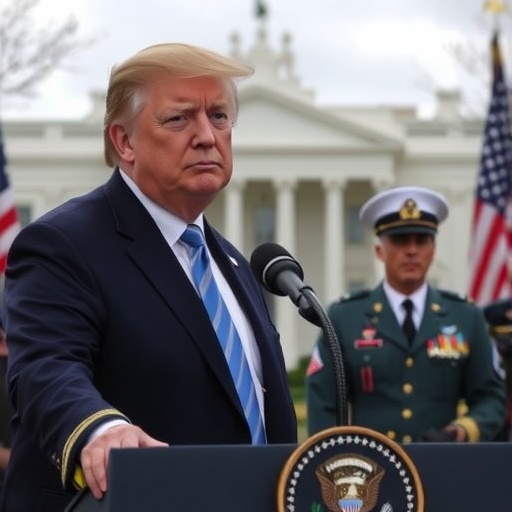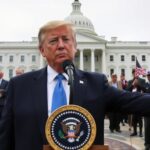Government shutdown Hits 25th Day: Trump Administration Secures Private Military Funding Amid Budget Impasse
In a stunning display of private-sector intervention, President Donald Trump has pledged to personally fund military paychecks for the duration of the ongoing Government shutdown, now in its 25th day, as Congress remains deadlocked over budget negotiations. This unprecedented move comes after the House of Representatives rejected a clean continuing resolution (CR) for the third time this week, leaving essential services in limbo and amplifying the Trump administration‘s frustration with what it calls congressional obstructionism.
- House Democrats Block Clean CR, Fueling Shutdown Standoff
- Trump’s Bold Private Pledge: Ensuring Military Funding Without Congress
- Economic Ripples Widen as Shutdown Drains Billions from U.S. Economy
- Congressional Gridlock Deepens: Voices from the Hill on Path Forward
- Looking Ahead: Potential Breakthroughs and Risks in Budget Battle
The shutdown, triggered by disputes over border wall funding, has furloughed over 800,000 federal workers and halted operations at national parks, museums, and regulatory agencies. Economic analysts estimate the daily cost at $160 million, pushing the total tab past $4 billion. Trump’s announcement, made via Twitter late Friday, highlights his commitment to the troops amid the budget standoff, but it also underscores the deepening divide between the White House and Capitol Hill.
House Democrats Block Clean CR, Fueling Shutdown Standoff
The Congress‘s repeated rejection of a clean continuing resolution has become the flashpoint of the Government shutdown, with House Speaker Nancy Pelosi leading the charge against any measure that doesn’t address broader Democratic priorities. On Thursday, the House voted 239-185 to table a clean CR proposed by Republicans, marking the latest in a series of procedural maneuvers that have extended the impasse.
“We cannot in good conscience pass a bill that ignores the needs of American families while funneling billions to a divisive wall,” Pelosi declared in a floor speech, echoing sentiments from progressive lawmakers. The clean CR, which would have funded the government through March without additional appropriations, was seen by Republicans as a straightforward solution to reopen agencies and pay federal employees retroactively.
Behind the scenes, negotiations have been fraught. Sources close to the talks reveal that informal discussions between House Majority Leader Steny Hoyer and Senate Minority Leader Chuck Schumer broke down over demands for disaster relief funding for hurricane-hit states. This rejection not only prolongs the shutdown but also complicates the path forward, as midterm election pressures mount on both parties.
Historically, short-term CRs have resolved past shutdowns, but the current budget battle is uniquely polarized. The last major shutdown in 2013 lasted 16 days over Obamacare funding; today’s crisis, centered on immigration, shows no signs of abating soon. Federal workers, from IRS auditors to Smithsonian curators, are feeling the pinch, with many resorting to food banks and credit cards to make ends meet.
Trump’s Bold Private Pledge: Ensuring Military Funding Without Congress
President Trump’s decision to secure private funds for military funding represents a dramatic escalation in the Trump administration‘s response to the shutdown. Speaking to reporters at the White House, Trump stated, “The men and women of our armed forces will not go unpaid on my watch. I’ve reached out to some very generous patriots who are stepping up to ensure our troops get what they deserve.”
Details of the private funding remain opaque, but insiders suggest involvement from high-profile donors and corporations with defense ties. The Pentagon, which employs over 2 million active-duty personnel, had warned of potential disruptions to payroll if the shutdown extended beyond January. Under normal circumstances, military pay is exempt from shutdowns due to statutory protections, but support staff and civilian contractors face furloughs.
This initiative isn’t entirely without precedent; during the 2013 shutdown, private entities like the Smithsonian received donations to keep parts of the National Zoo operational. However, Trump’s personal involvement elevates the stakes, potentially setting a new norm for executive-branch fundraising during fiscal crises. Critics, including Senate Budget Committee Ranking Member Lindsey Graham, have mixed reactions: “It’s admirable, but it shouldn’t be necessary. Congress needs to get its act together.”
The move has also spotlighted the human element of the government shutdown. Coast Guard families, in particular, have shared harrowing stories online, with one viral post from a furloughed officer reading, “We’re on food stamps while protecting the nation—ironic, isn’t it?” Trump’s pledge aims to mitigate such hardships for service members, but it leaves 400,000 civilian defense workers in uncertainty.
Economic Ripples Widen as Shutdown Drains Billions from U.S. Economy
As the government shutdown stretches into its fourth week, the economic fallout is becoming increasingly visible, with small businesses near federal sites reporting steep revenue drops and consumer confidence surveys hitting multi-year lows. The Congressional Budget Office projects a $1,200 per household loss in economic output if the shutdown persists through February, factoring in delayed IRS refunds and stalled infrastructure projects.
National parks, closed since December 22, have lost an estimated $50 million in visitor spending alone, according to the National Park Service. In Washington, D.C., the shutdown’s epicenter, hotels and restaurants are operating at 30% capacity, per a report from the D.C. Hospitality Association. “Tourists are canceling trips left and right,” said association president Joe Martin. “This isn’t just federal workers suffering—it’s the entire service economy.”
On the budget front, the standoff has frozen $40 billion in discretionary spending, including vital programs for veterans’ affairs and environmental protection. Stock markets have shown volatility, with defense contractors like Lockheed Martin dipping 2% amid fears of contract delays. Economists at Moody’s Analytics warn that prolonged uncertainty could shave 0.5% off GDP growth in the first quarter of 2019.
Moreover, the shutdown exacerbates existing fiscal pressures. With the national debt ceiling looming in March, lawmakers face a triple threat: resolving the current impasse, passing a full-year budget, and averting default. Bipartisan groups like the Problem Solvers Caucus are pushing for compromise, but partisan rhetoric dominates, with Trump tweeting, “Democrats own this shutdown—time to build the wall!”
Congressional Gridlock Deepens: Voices from the Hill on Path Forward
Inside the halls of Congress, frustration is palpable as the government shutdown exposes deep fissures in bipartisan cooperation. Republican Senator Rand Paul, a vocal critic of spending bills, argued on the Senate floor, “This shutdown is a symptom of our addiction to unchecked budgets. We need real reform, not Band-Aid CRs.” Democrats, meanwhile, point to Trump’s insistence on $5.7 billion for border security as the root cause.
Key players are maneuvering for leverage. House Republicans, led by Minority Leader Kevin McCarthy, have introduced alternative bills tying shutdown relief to DACA protections, hoping to appeal to moderate Democrats. Yet, with the Senate requiring 60 votes for passage, filibuster threats from hardliners on both sides stall progress. A recent poll by Quinnipiac University shows 52% of Americans blaming Trump for the shutdown, up from 45% a week ago, adding political heat.
Expert witnesses before the House Oversight Committee painted a grim picture. Dr. Elaine Kamarck, a Brookings Institution fellow, testified, “Shutdowns aren’t just inconvenient—they erode public trust in government. We’ve seen productivity losses equivalent to 1.5 million workdays already.” Her comments underscore the long-term damage to federal morale and recruitment.
Amid the chaos, glimmers of negotiation emerge. Backchannel talks between White House Chief of Staff Mick Mulvaney and Senate Appropriations Chair Richard Shelby focus on a compromise package that includes wall funding offset by increased aid for opioid crisis response. However, Pelosi’s office dismissed these as “smoke and mirrors,” insisting on a clean bill first.
The Trump administration‘s military funding workaround has bought time for troops but highlighted Congress’s failure to act. As one anonymous GOP aide put it, “This shutdown is testing the limits of our democracy—how long can we go without paying our bills?”
Looking Ahead: Potential Breakthroughs and Risks in Budget Battle
With the 25th day of the government shutdown behind us, eyes turn to upcoming milestones that could break the deadlock or prolong the pain. A critical House vote on a modified CR is scheduled for early next week, potentially incorporating $15 billion in border security without a full wall designation—a concession floated by moderate Republicans.
The Trump administration has signaled flexibility, with Trump telling Fox News, “I’m open to deals that secure our borders and get workers back on the job.” Yet, hardline supporters like Freedom Caucus members vow to oppose any watered-down measure, risking further isolation in the Senate.
Economically, the stakes are high. If unresolved by mid-February, the shutdown could trigger payment delays for Social Security beneficiaries and tax refunds, alienating even shutdown skeptics. International observers, including the IMF, have noted the U.S. crisis as a drag on global growth, with trade negotiations suffering from distracted policymakers.
Forward momentum may come from public pressure. Grassroots campaigns, such as #EndTheShutdownNow, have garnered over 500,000 signatures, urging Congress to prioritize people over politics. Bipartisan retreats planned for late January could foster dialogue, but history suggests optimism is cautious—previous shutdowns ended only after exhaustion set in.
Ultimately, resolving this budget standoff will require compromise on immigration, spending caps, and fiscal responsibility. As federal workers brace for another paycheck-less weekend, the nation watches whether leaders can rise above partisanship to restore normalcy. The path forward remains uncertain, but the urgency has never been greater.







